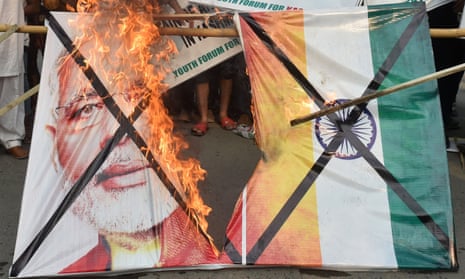On Valentine’s Day this year, Narendra Modi went on a date with Bear Grylls. As the two men set off on an “adventure of a lifetime” in India’s Corbett national park, 500 miles to the north in the valley of Kashmir a suicide bomber drove a truck laden with explosives into a convoy of vehicles carrying Indian paramilitary forces. Forty troops were blown to bits in the blast. It was the bloodiest single atrocity suffered by Indian security personnel in the savage history of the Kashmir conflict.
A trailer for Grylls’ programme Man vs Wild, released last week by Discovery, shows the duo wandering the wilderness that afternoon, sniffing animal excrement and sharing laughs and survival techniques. Opposition politicians have seized on the film to accuse the Indian prime minister of not interrupting his escapade with Grylls immediately on news of the atrocity – a charge the government has denied.
Either way, Modi, a consummate method actor, was playing “the conservationist”. He added this role to an extensive repertoire – poet, sage, statesman, he-man, yogi – that he has deftly deployed to craft a cult of personality unrivalled in the democratic world, not least for a man who was once widely castigated as a Hindu supremacist. Within two weeks of the shoot, Modi, campaigning for re-election, ordered Indian jets to breach Pakistan’s airspace and bomb targets deep inside enemy territory. That decision, drawing south Asia’s nuclear-armed adversaries to the precipice of an all-out war, helped to seal Modi’s victory even before a vote was cast. And in the two months since his triumph, Modi has moved aggressively to consolidate his grip and establish himself as the father of what his worshippers call “New India”.
The solidification of the cult of Modi has been accompanied by an aggressive erosion of the legal and constitutional foundations on which the Indian republic stands. Last week the government arrogated to itself powers to designate individuals as terrorists. Presumption of innocence, legal representation and the right to judicial appeal – everything that distinguishes a civilised democracy from an autocracy – is severely restricted. Muslims and other minorities, favoured quarry of the lynch mobs emboldened by the regime, will be the principal targets of the new measures.
Lest there was any doubt, Amit Shah, Modi’s dreaded enforcer and the minister responsible for law and order, clarified in parliament that “urban Naxals” – a label that encompasses everyone from leftwing intellectuals to rootless cosmopolitans sceptical of the Modi regime – “will not be spared”.
Organised political opposition to Modi and the ruling Bharatiya Janata party is being meticulously wiped out. July ended with the collapse of a coalition government in Karnataka, one of the few states where the BJP was not in power, after several legislators on the ruling side dramatically resigned.
Now August has begun with the partition and abolition of the troubled state of Jammu and Kashmir – which acceded to India in 1947 on the assurance that it would be granted special constitutional safeguards – by a presidential decree. Kashmir is now under the thumb of the union government, and the region’s elected leaders have been thrown in jail. Communications, including land lines, have been cut off. Ordinary Kashmiris have no means of speaking to the rest of India. The most monumental redesign of Delhi’s constitutional arrangement with India’s sole Muslim-majority state, hatched in secrecy, occurred without a debate in parliament.
Modi’s willingness to take the risk was no doubt dictated by the reward. He has in one stroke ground down and humiliated Kashmiris, and held them up as an example to other Indian states, a demonstration that nobody is immune from his untrammelled authority. The termination of Kashmir’s special status is simultaneously a culmination of a longstanding Hindu nationalist yearning to domesticate the region’s dissenting Muslim majority and a successful test case for the project to remake the entirety of India in accordance with Modi’s ideology. What has happened there will be repeated elsewhere. A spike in militancy or even an outbreak of hostilities with Pakistan can only boost the fortunes of a leader who, presiding over a decelerating economy, has little to offer besides demagogy.
“One country, one system,” Modi’s acolytes cry with sadistic glee at Kashmiris who are curfewed and cut off from the world. Next week India will mark 72 years of independence from British rule. For many Indians, forced suddenly to pledge allegiance to a de facto one-party state under one supreme leader, it will be the beginning of an inquisition – not an occasion for celebration.
Kapil Komireddi is the author of Malevolent Republic
